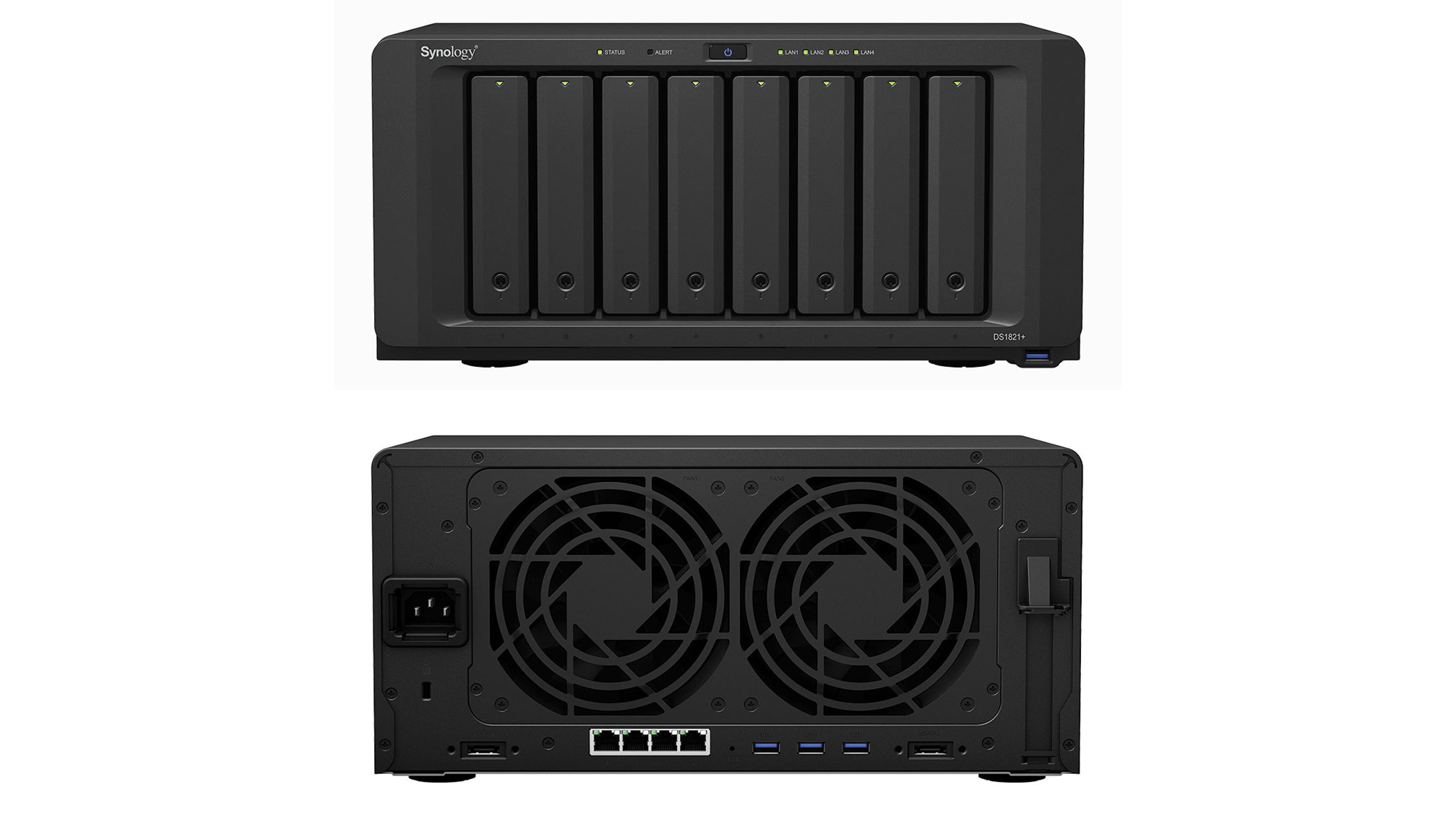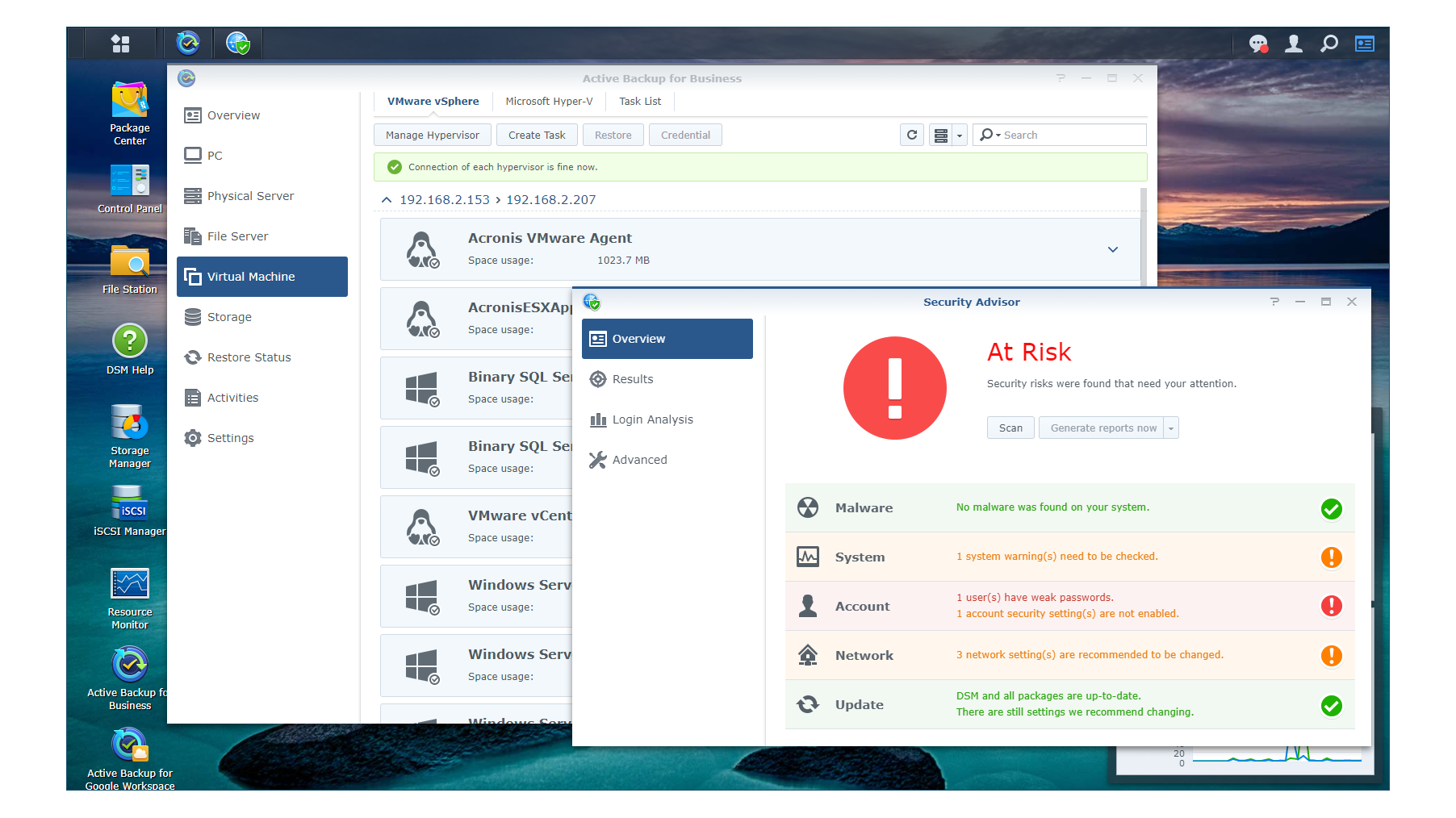Synology DiskStation DS1821+ review: Hard to fault
A powerful desktop NAS offering every storage feature an SMB is likely to need at a very fair price


-
+
Outstanding performance
-
+
Plenty of apps and features
-
+
Includes server-grade ECC RAM
-
-
No multi-Gigabit ports included as standard

The DS1821+ represents a change of direction for Synology: it’s one of a new range of NAS appliances that ditch the familiar Intel processors and put AMD in the driving seat instead. This model replaces the old DS1819+, and comes with a quad-core 2.2GHz AMD Ryzen V1500B processor in place of the 2.1GHz Intel Atom C3538 CPU.
There are other subtle upgrades too. Memory provision remains the same – 4GB of DDR4, upgradeable to 32GB – but the DS1821+ comes with server-grade ECC RAM to ensure business-class reliability.
And while the DS1821+’s sturdy charcoal-black steel chassis may appear the same as its predecessor’s, its eight hot-swap drive bays are now joined by dual M.2 NVMe SSD slots –although these can only be used for caching and not for regular storage.
If you do need to extend capacity, that can be done round the back, via four USB-A 3.2 ports and dual eSATA ports, which connect to Synology’s five-bay DX517 expansion units.
Next to those connectors sit a quartet of Gigabit Ethernet ports; a free PCIe slot allows for an upgrade to 10GbE, but note that Synology is now focusing on its own-brand cards and no longer supports many third-party vendors. When we tried fitting an Emulex 10GbE card – which had worked fine in the DS1819+ – the DS1821+ simply hung during the boot. Luckily, it was happy to work with our dual-port Intel X520 model.
Installation proved undemanding. Synology’s discovery web portal quickly located the appliance on our network and downloaded the latest DSM 6.2 software. For testing, we installed four 14TB WD Red Plus drives and used the Storage Manager app to combine them into an SHR (Synology Hybrid RAID) storage pool.

We’ve certainly no complaints about speed. Accessing the unit over 10GbE from a Dell T640 Xeon Scalable host running Windows Server 2019, Iometer recorded read and write speeds of 9.2Gbits/sec and 8.7Gbits/sec. That’s just as fast as the DS1819+ for read performance, and a lot quicker for writing – the older model only managed 4.8Gbits/sec.
The DS1821+ aced our real-world tests too. We read a 25GB file from the appliance at 5Gbits/sec and wrote it back at 4.1Gbits/sec, while our backup test using a 22.4GB folder containing 10,500 small files was copied up at an average of 2.6Gbits/sec. Notably, the Ryzen CPU handles encryption much better than the Atom: our 25GB test file was written to an encrypted NAS folder at 2.6Gbits/sec, representing a 63% boost over the old model.
As for software, Synology’s DSM platform offers an exceptional range of features, especially when it comes to data protection. Btrfs volumes support both manual and scheduled snapshots, while the Hyper Backup app manages all local, remote, Rsync, cloud and iSCSI LUN backups from a single console.
The free Active Backup Suite adds extra options, comprising a set of three apps that can secure data on Windows systems, VMware and Hyper-V VMs and cloud data from Google Workspace and Microsoft 365. Recovery features are outstanding: after running agentless backups of VMs on our VMware vSphere 7 system, we were easily able to restore entire VMs back to the host or use the ABB portal to view guest OS files and restore them individually.
Meanwhile, the appliance itself is kept safe by the Security Advisor app, which scans regularly for malware and security issues and offers advice on closing any potential holes.
We’d have liked to see multi-Gigabit ports built in as standard, but even without them, the DS1821+ is an excellent NAS appliance. The AMD Ryzen CPU gives a real performance boost, the software is hard to fault - and it’s great value to boot.
Synology DiskStation DS1821+ specifications
| Chassis | Desktop chassis |
| CPU | 2.2GHz AMD Ryzen V1500B |
| Memory | 4GB DDR4 ECC (max 32GB) |
| Storage | 8 x LFF/SFF hot-swap SATA drive bays |
| PSU | 250W internal PSU |
| RAID support | Supports RAID0, 1, 10, 5, 6, SHR-1/2, hot-spare, JBOD |
| Network | 4 x Gigabit Ethernet |
| Other ports | 4 x USB-A 3.2, 2 x eSATA, PCIe slot |
| Management | Web browser management |
| Dimensions (WDH) | 343 x 243 x 166mm |
| Warranty | 3yr hardware warranty |
Get the ITPro daily newsletter
Sign up today and you will receive a free copy of our Future Focus 2025 report - the leading guidance on AI, cybersecurity and other IT challenges as per 700+ senior executives
Dave is an IT consultant and freelance journalist specialising in hands-on reviews of computer networking products covering all market sectors from small businesses to enterprises. Founder of Binary Testing Ltd – the UK’s premier independent network testing laboratory - Dave has over 45 years of experience in the IT industry.
Dave has produced many thousands of in-depth business networking product reviews from his lab which have been reproduced globally. Writing for ITPro and its sister title, PC Pro, he covers all areas of business IT infrastructure, including servers, storage, network security, data protection, cloud, infrastructure and services.
-
 Cleo attack victim list grows as Hertz confirms customer data stolen – and security experts say it won't be the last
Cleo attack victim list grows as Hertz confirms customer data stolen – and security experts say it won't be the lastNews Hertz has confirmed it suffered a data breach as a result of the Cleo zero-day vulnerability in late 2024, with the car rental giant warning that customer data was stolen.
By Ross Kelly Published
-
 Women show more team spirit when it comes to cybersecurity, yet they're still missing out on opportunities
Women show more team spirit when it comes to cybersecurity, yet they're still missing out on opportunitiesNews While they're more likely to believe that responsibility should be shared, women are less likely to get the necessary training
By Emma Woollacott Published
-
 OpenAI wants developers using its new GPT-4.1 models – but how do they compare to Claude and Gemini on coding tasks?
OpenAI wants developers using its new GPT-4.1 models – but how do they compare to Claude and Gemini on coding tasks?News OpenAI says its GPT-4.1 model family offers sizable improvements for coding, but tests show competitors still outperform it in key areas.
By Ross Kelly Published